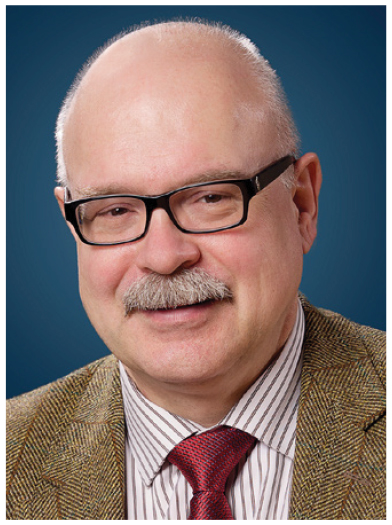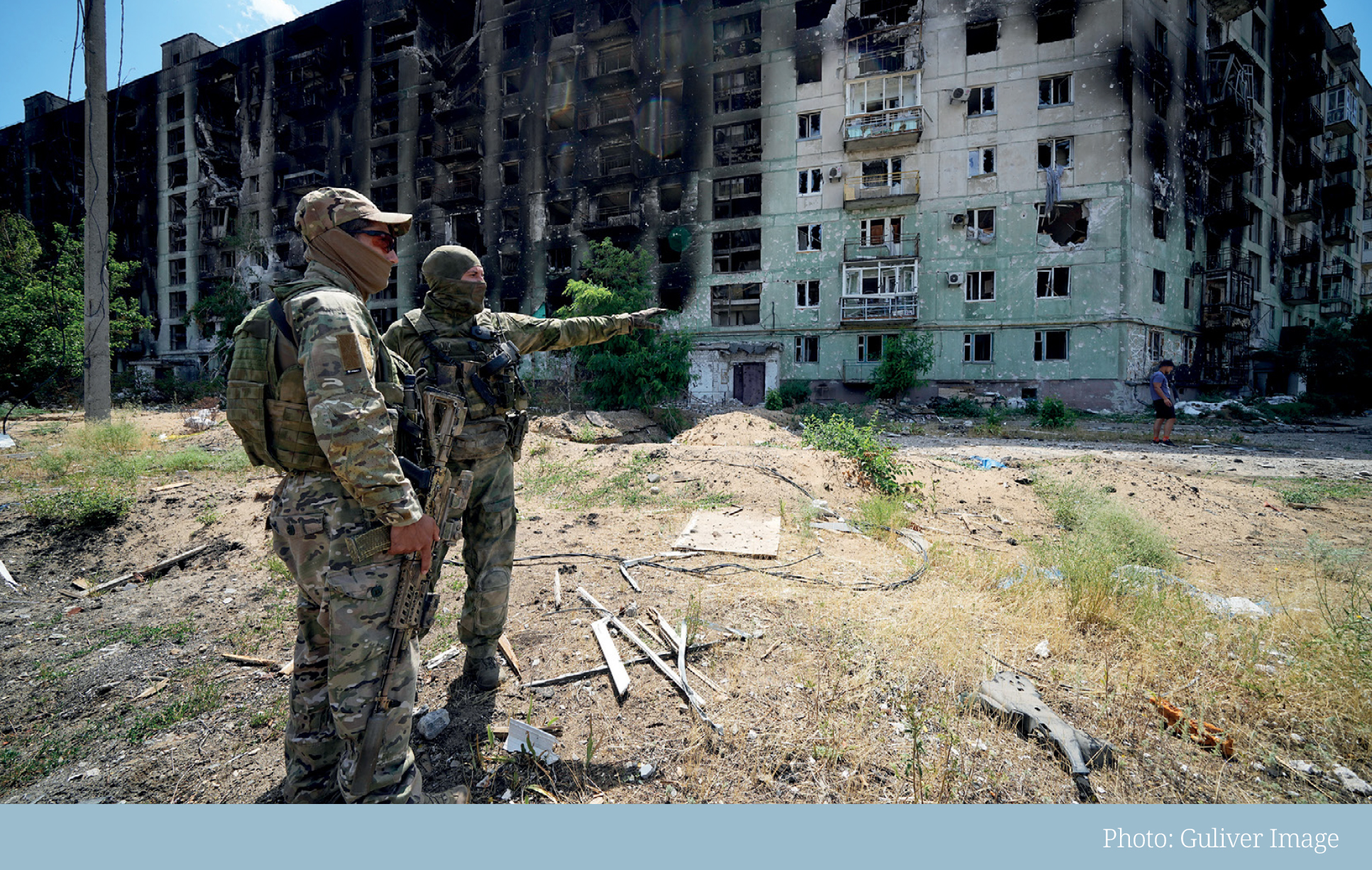 Dmitri Trenin is a Research Professor and Academic Supervisor of the Institute of World Military Economy and Strategy at the Higher School of Economics (HSE University), and a Leading Research Fellow at the Institute of World Economy and International Relations (IMEMO), both in Moscow.
Dmitri Trenin is a Research Professor and Academic Supervisor of the Institute of World Military Economy and Strategy at the Higher School of Economics (HSE University), and a Leading Research Fellow at the Institute of World Economy and International Relations (IMEMO), both in Moscow.
Bleak Prospects for Russian-American Relations
Over the past year, Russia has been watching the U.S. presidential election campaign with a heavy dose of equanimity. This may come as a surprise, given that over the past two-plus years, the two countries have been moving ever closer to a kinetic collision with a potential deployment of nuclear weapons.

“Moscow doesn’t need an armistice on Washington’s terms...” Russian soldiers in Severodonetsk
No Real Preference
First of all, Moscow has no real preference regarding the U.S. presidential candidates. True, Russian President Vladimir Putin declared in early 2024 that he “supported” Joe Biden—the incumbent U.S. leader who had repeatedly verbally abused Putin in his public remarks. Many observers labeled this as trolling. But in mid-summer, when Biden was replaced as the Democratic Party candidate in a U.S. version of a palace coup, the Russian President publicly backed Biden’s running mate, Vice President Kamala Harris, arguing that the endorsement formerly extended to Biden was valid for “his chosen successor.” This second endorsement created even more disbelief, and Dmitry Peskov, the Kremlin’s official spokesman, later revealed that Putin “was joking.”
In the past, the Russian President was always careful to point out that Moscow did not interfere in U.S. and other foreign elections and was ready to work with any person who would win the trust of American (or any other) people. However, now that Russia—since 2016—stands permanently accused of election meddling in the United States, Putin abandoned his former public studiousness and chose to make some fun of the U.S. media. He may have chuckled at American pundits’ immediate confusion, not knowing how to read his double endorsement of the Democrats fighting Donald Trump—whom they had long labeled the Kremlin’s candidate.
As they say, each joke has an element of a joke. In 2016 and 2017, Trump was someone whom many Russians—not only experts and observers but also politicians like the late Vladimir Zhirinovsky—considered Russia’s best choice. The 45th U.S. President seemed a foreign policy realist, ready to take on the Washington “swamp,” including the infamous foreign policy establishment (the Blob), and vowed to “get along well” with Putin and Russia. Because of these inflated expectations, Trump soon turned into a major disappointment with that crowd. He bogged down completely in the swamp he wanted to drain in the first place. Furthermore, he had to sign more anti-Russian sanctions—some of which were initiated by the White House—than any of his predecessors, and he ultimately started transferring lethal weapons to Kiev.
Today, in place of expectations, there is widespread skepticism. The Republican candidate’s promise of quick peace in Ukraine is sneered at. If elected to the White House again, Trump may indeed come up with a ceasefire proposal—but Moscow doesn’t need an armistice on Washington’s terms. The Kremlin is determined to achieve the goals of the “special military operation” or, to put it differently, to eliminate the reasons that had made that operation necessary in the first place. Admittedly, this is a tall order—but anything less would simply guarantee that the unresolved conflict would erupt again after a pause, with even more intensity and casualties.
As for the war of attrition, Russia has a combination of superior resources, general public support, and steady leadership—all necessary to achieve a victory. Of course, the combined resources of the West vastly outsize those of Russia, but the stakes for Moscow in the ongoing fight are way higher than they are for Washington and its dozens of allies. Russia has also managed to successfully adapt itself to the “war in the time of peace.” It has been able to bear the cost of the war—including its significant human losses—and has defeated Western attempts to isolate it from the wider world. As things stand in the Fall of 2024, the Russian army is steadily moving forward in Donbass, with its progress on the battlefield being made easier by Ukraine’s failed Kursk adventure.
This is a long way of saying that Trump’s idea of a ceasefire makes no one in Moscow enthusiastic. It is not at all clear how “Trump the Unpredictable” might react to the Kremlin turning him down. Few expect him to concede defeat in Ukraine and negotiate in good faith on the terms that Moscow would regard as fair and acceptable. Instead, many experts point out that the Republican Party has a number of personalities who are virulently anti-Russian. Some of them, like Senator Lindsay Graham, are very close to Trump. The bottom line on the GOP candidate would thus run like this: it is still possible that Trump may return to the White House, but this is not the horse to bet on.
Neither is the Democratic Party’s candidate. A Kamala Harris Presidency would continue the course that, if unchecked, could result in the first-ever, and likely last, U.S.-Russian war. The good thing is that recently, there have been few, if any, illusions in the Kremlin regarding the Democrats. The best that can be said in Moscow of the current Biden-Harris and potentially future Harris-Walz administrations is that they are a “known known” or, to put this slightly less reverently, the devil we know. Bottom line again: seen from the Russian capital, both Harris and Trump “are worse” for the U.S.-Russia relationship—which will continue to deteriorate dangerously—whichever camp wins the race. As if to drive the message home, Anatoly Antonov, Russia’s ambassador to the United States and the MFA’s foremost expert on arms control, completed his mission and departed from Washington exactly a month before Election Day. No successor has been immediately named to take his place.
Who Runs the United States?
It is actually even worse than it looks. In 2024, more Russians than ever have come to believe that U.S. elections don’t matter that much. The way Biden was—evidently against his wishes—replaced by Harris, and the way she was turbo-rushed to the party nomination, with her image and the scale of her political persona enhanced from the floor level to the absolute maximum hugely impressed those Russians who were watching the U.S. election campaign. The campaign, it needs to be added, was closely monitored and widely covered by the Russian media.
For Russians, the question of who runs the United States is not an academic one. They regard the Ukraine conflict as a proxy war fought by the United States and its satellites, with Washington firmly in command: a de facto enemy, not an adversary, as before. So, the question of where the U.S. power center lies is logically of prime importance. So far, there is consensus on one thing: this is not the Oval Office. This means that Joe Biden is, and—depending on the election’s outcome—Kamala Harris or Donald Trump would be, nothing more than figureheads. Trump, of course, may be prone to stage a genuine rebellion, unlike the one on January 6th, 2021, but his chances of winning that one are slim.
Beyond the figureheads, various experts point to powerful political groups—“American families”—like the Obamas and the Clintons in the Democratic Party; the Bushes, in the GOP, never quite matched their influence. It was the former who likely staged a successful coup that toppled Biden. Then, there is the Deep State, the power of professional bureaucracy, especially at the top and senior levels, that can sabotage any elected official and render any administration quasi-impotent. And finally, and most importantly, there is the Ruling Oligarchy, the source of financial and media resources to wage political campaigns, that has globalist ambitions.
Of course, this may sound unscientific, but the conclusion is clear. All these groups—and many factions within them in their different, often uncoordinated, and occasionally contradictory ways—have mobilized to protect U.S. global hegemony, thwart the challenges coming from non-Western countries, and ensure that the new world order reflects the revolutionary ideas of twenty-first-century liberalism that far outstrip the agenda of another Western ideology (communism) over which it prevailed.
Systemic Conflict
Many thoughtful Russians recognize that Washington’s conflict with Moscow is of systemic nature. It is not all Realpolitik and geopolitics, e.g. regarding the fate of Ukraine. Material interests are important, but they are not all there is to it. Thus, it is not one of those conflicts that characterize relations between states as part of a never-ending international political cycle of alignment, neutrality, and adversity. Most Russians dismiss, of course, the notion of democracy versus autocracy, which lies at the heart of Western rhetoric. To them, this is sheer hypocrisy, so characteristic of the United States.
They also reject the idea that the current conflict is borne out of some tragic misunderstanding. If anything, it is just the opposite. Russians and Americans read each other basically right, and this is the source of a potential tragedy. Essentially, the Washington-led universal hegemonism has run into something that by far surpasses mere refusal, amounting to Russia’s de facto inability to accept any state as the world’s hegemon: not Napoleon’s France in the nineteenth, not Hitler’s Germany in the twentieth, and not the United States in the twenty-first century.
Post-Soviet Russia did seek to integrate into the American-led system but on conditions of equality and autonomy. Americans saw this quest for what it was—a potential for undermining U.S. hegemony, known as leadership, from within—and barred Russia from entering the tent. However, what they failed to account for was Russia’s capacity and willingness to mount a serious challenge to that hegemony from outside the tent. This is why inflicting a strategic defeat on Russia now is a key requirement for sustaining the U.S. global standing.
In Moscow today, confrontation with the United States is seen as part of Russia’s internal transformation. It is not only the last chapter of the country’s long history—the last three-plus decades or so—that has been closed. What is also closing quickly is the entire volume dealing with more than the last three centuries of Russia’s history, in which its principal focus was placed on the West as a mentor and model. In its Foreign Policy Concept adopted in 2023, Russia has officially redefined itself as a state-civilization. It is now gearing up to live up to that. To succeed in that endeavor, Russia must not only achieve its military and political goals in Ukraine, but also ensure the successful postwar reconstruction of the region—material as well as mental.
This makes it inevitable that the U.S.-Russia confrontation will be a long one—provided that the Western-driven escalation of the Ukraine conflict is arrested before it sets off some truly catastrophic scenarios. If the current war ends in a Cold War-style stand-off from the Barents Sea to the Baltic to the Black Sea, other battlefields may be activated, from the Arctic to Africa, and from cyberspace to outer space. It will take a long time before Russian-American relations reach even the surface level, to say nothing of mutually accepted norms that will need to be developed to elevate the relationship above it.
Meanwhile, personal leadership and leaders’ personalities will matter in both countries—probably much more so in Russia than in the United States. While not holding breath for the outcome of the 2024 U.S. presidential race, Russians will be intensely focused on what follows it.







